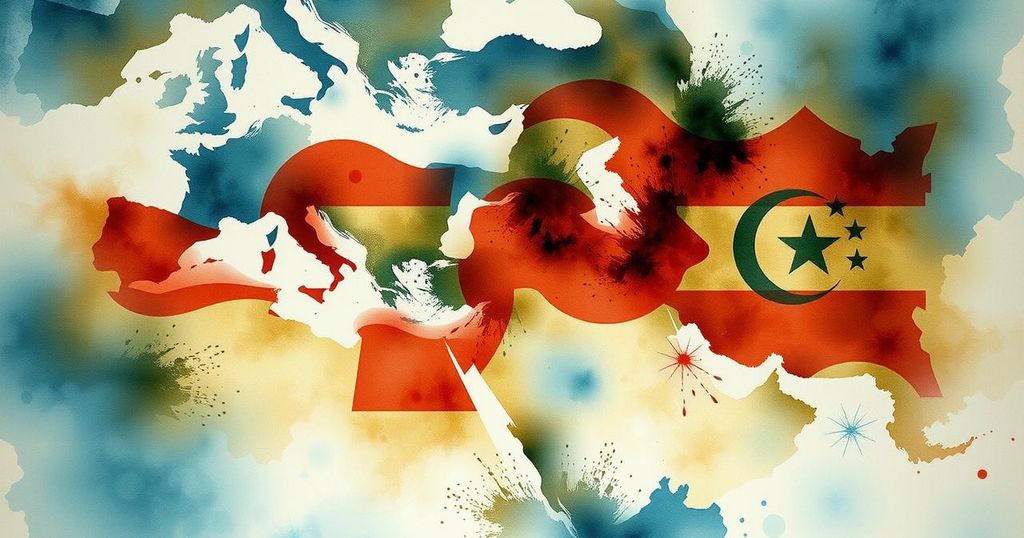Walid Jumblatt on the Challenges Ahead for Lebanon and Syria
Walid Jumblatt, a key Druze politician, critiques Israeli military actions and the implications for Lebanon while advocating for Syrian President Ahmad Al Sharaa. He highlights the challenges in Lebanese reconstruction and calls for international support unlinked to reforms. Jumblatt reaffirms the importance of Hezbollah’s evolution and the necessity of Palestinian statehood in negotiations with Israel.
Walid Jumblatt, the prominent Druze politician, has long influenced Lebanon and the broader Middle Eastern political landscape. Although stepped down as the head of the Progressive Socialist Party, his insights remain significant amidst the tumultuous political climate. His perspectives on Israel’s actions, coupled with changing dynamics in Syria, highlight his understanding of the region’s complexities and the need for strategic diplomacy and cooperation.
In a recent interview with The National, Jumblatt commented on the heightened threat posed by Israel, stating, “Israel has a free hand. It’s up to the Arabs to understand the dangerous policy of Israel that is planning to dislocate the whole of the Arab world.” He expressed concern over Israel’s ongoing attacks and military occupation strategy in Lebanon, describing it as an illusion that the ceasefire agreements effectively quelled hostilities.
Despite a ceasefire brokered by the United States, Jumblatt argues that Israel acts with impunity, continuing bombardments of southern Lebanon. He noted, “The Israelis have allowed themselves to attack any place in Lebanon, any place in Syria, maybe any place in the Arab world if according to them it is supposed to be a danger to them.”
Jumblatt highlighted the Lebanese Army’s commendable efforts in maintaining order amidst chaos but acknowledged the formidable challenges they face due to a lack of resources and external support needed for reconstruction following the Israeli assault, which has already incurred an estimated $14 billion in damages.
Moreover, he addressed the crucial need for international assistance, especially with donors conditioning aid on unpopular reforms within Lebanon’s struggling financial sector. Jumblatt criticized this approach, arguing that humanitarian support for citizens affected by war should not be tied to political reforms.
With the recent assassination of Hezbollah leader Hassan Nasrallah, Jumblatt remarked on the necessity for Hezbollah to adapt its stance, asserting, “Hezbollah should understand that now, going back to the old methods… armed resistance – it won’t work.” He acknowledged that despite Hezbollah’s political presence, its approach must evolve to meet contemporary challenges.
Turning to Syria, Jumblatt advocated for supporting the newly inaugurated President Ahmad Al Sharaa and emphasized the importance of a unified Syria. He stated, “Give Ahmad Al Shara a chance. Because when you give Ahmad Al Shara a chance, you are giving a chance to the Syrian people.”
Despite the historical complexities in the Jumblatt-Assad relations, Jumblatt has cautiously welcomed the new Syrian government while remaining critical of Israeli aspirations to undermine Syria’s stability through various tactics, including military aggressions against Syrian territories.
Finally, Jumblatt refrained from endorsing normalization with Israel, reinforcing his stance against capitulating to foreign pressures. He proclaimed, “I cannot go back to the old situation whereby firing rockets could alter Israeli policy. We have to adopt a new policy based on keeping the state of armistice between us and Israel.” He called for a future that guarantees the emergence of a Palestinian state, emphasizing that substantial peace demands equitable resolutions for all affected parties.
In conclusion, Walid Jumblatt’s insights reflect a deep understanding of the geopolitical nuances in Lebanon and the Middle East. His critiques of Israeli policies and demands for international aid underscore the pressing needs of the Lebanese people. Moreover, his advocacy for a unified approach in Syria and his stance against normalization with Israel illustrate a commitment to dignity and resilience for his community and the broader Arab region. Jumblatt’s experiences and viewpoints offer significant contributions to the ongoing discourse on peace and stability in the region.
Original Source: www.thenationalnews.com




Post Comment